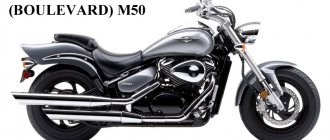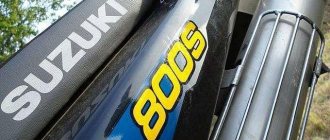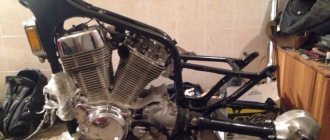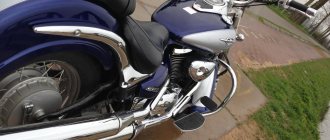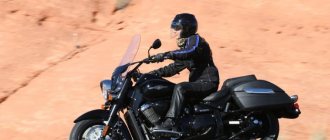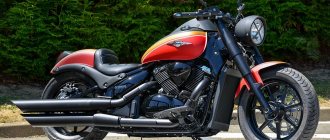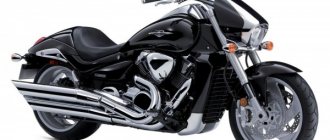Description
The Suzuki Intruder 800 series of classic cruisers begins its history in 1992, namely with the appearance on the market of the Suzuki VS800 Intruder model, which replaced the Suzuki VS 750 Intruder. In 1996, an offshoot appeared - the Suzuki VZ800 Desperado/Marauder, and since 2001 - the Suzuki VL800 Volusia. These modifications are almost identical in technical terms, built on the same engine and differ only in layout. Since 2005, Suzuki has combined these modifications into a common Boulevard line for the American market:
Suzuki VS800 Intruder -> Suzuki Boulevard S50
Suzuki VL800 Volusia -> Suzuki Boulevard C50 (C50T - touring version)
Suzuki VZ800 Marauder -> Suzuki Boulevard M50
Suzuki VL 800 Volusia. The choppers are coming!
The Volusia is the latest version of the updated VL800 Intruder motorcycle and is also its main contender among mid-power cruisers. If we talk about the name of the Volusia motorcycle, it gets it from the area in Florida, where the Daytona Speed event has been held for quite some time.
If you look at the Volusia motorcycle from the side, it looks like a solid motorcycle. The presence of deep fenders covering the wheels, a thick tank, and a dual exhaust pipe on the right side says: “I am a huge bike! » Apparently, during the production of this bike, almost all attention was paid to this. Manufacturers have tried to create a bike that looks like a 1500cc but sells it as an 800cc.
In addition to the fact that the motorcycle has a lower price, it also weighs much less than a full-fledged 1500cc motorcycle. Having a motorcycle that is lightweight is quite an important detail for those who are just starting to ride a motorcycle, or for those who are trying to achieve better handling of the bike.
The Volusia has a liquid-cooled 45-degree V-twin engine. Initially, this engine was installed on the Suzuki VZ800. It looks pretty decent in the single-carburetor Volusia. The bike has enough power to get you going in high gear.
Including the engine is quite balanced, due to which vibrations are not particularly felt and bothersome. It works much softer and smoother than the Harley 883. As for other controls, the gas, clutch, and gear shifting are set just perfectly, so it’s a pleasure to ride.
The suspension installed on the Volusia is quite standard, namely short-stroke with monoshock absorbers. This suspension is well suited for various motorway trips. As for the dead roads, it will not be very comfortable, since the suspension is a little harsh. However, there is a way out here too; the seven-position compression stroke adjustment will help you soften the suspension.
The Volusia has a non-adjustable front fork, which does a pretty good job of its immediate responsibilities, namely: absorbing road bumps and providing the bike with excellent stability. The Volusia's front brake works well, but you'll have to press it hard. The presence of a soft and comfortable wide saddle will give you only positive riding emotions, although the presence of a hard rise in the rear will get boring on unfinished domestic roads!
Note: The installation network sells and installs glass on cars, including Volvo windshields. When choosing glass, you can also choose a specific tint option.
Related materials:
- Suzuki Boulevard C50
The C50 Boulevard is the soul of a standard cruiser, powered by a V-twin engine that's always raring to go. The classic design of the Boulevard C50 begins with...
- Suzuki Hayabusa is included in the Guinness Book of Records and sold to a Kharkov resident
is an official dealer for the sale of SUZUKI motorcycles and cars in the city of Kharkov. It was this company that was honored to sell the first motorcycle...
- What should you look for when buying a used Suzuki RGV250 Gamma?
When purchasing a used Suzuki RGV250 Gamma motorcycle, the most important thing is that you don’t get into your hands the motorcycle that the racer rode, roughly speaking...
- Minibike models from Suzuki
The most unusual and interesting model in the range of Suzuki motorcycles is a minibike called TR50 Street Magic. Looking at the model from the front, it looks like...
- Suzuki gs 500 motorcycle - features, technical specifications, photos and videos
First of all, it must be said that the Suzuki GS 500 motorcycle is made in the best traditions of the Japanese manufacturer. At first glance, this model does not differ in anything special, however...
Brief history of the model
1992 - start of production and sales of the Suzuki VS800 Intruder model.
1996 - start of production and sales of the Suzuki VZ800 Desperado model (in the USA - Marauder).
2001 - start of production and sales of the Suzuki VL800 Intruder Volusia model. For the Japanese market, based on this model, a version was developed - Suzuki VL400 Intruder Classic.
2005 - all of the above models were combined into the Boulevard series (for the US market) and Intruder (for the European market). The motorcycles received significant external changes, an engine fuel injection system (except for the Boulevard S50) and a number of other updates. The Suzuki VZ800 Marauder/Desperado model (now Boulevard M50, Intruder M800) receives a cardan drive instead of a chain drive. The Suzuki Boulevard 400 model appears for the domestic Japanese market.
2010 - The Suzuki Boulevard S50 model is discontinued. The Boulevard M50 model is equipped with the same engine as the Boulevard C50, a small front fairing is added, and the shape of the wings and tank is changed, gaining common visual features with the M109R model.
pros
First, some lyrics. The appearance gives me goosebumps, this motorcycle is so beautiful.
The sound of its engine is exactly what I need. This is the rumbling of a bear, a rumbling, not a roar, powerful, low, even, strength is felt in it
At the same time, it is not loud, which is important because... I live in a quiet area and don’t want to disturb the general peace with the Harley roar (approx.
KB: there are different exhausts, and even customizable, although the price is not cheap).
And finally, from the same series – the smell of the engine. You stop driving, turn off the ignition, and feel the warmth rising from the engine and a wonderful aroma wrapping around the tank and gently tickling your nostrils.
On the Intruder, I have an excellent feel for that point when releasing the clutch and squeezing the gas when the bike starts to move. It's a nice feeling of control. For some reason it was difficult to catch this moment on the Yamaha. The start was either abrupt or too blurry.
I spoke about the saddlebags in negative terms, but there are also advantages. In my opinion, their attachments to the motorcycle are very well thought out. Turn the key in the lock, press the clamp and the case is in your hands. Same procedure in reverse and the case is securely fastened.
Characteristics:
| Models | Suzuki VS800 Intruder (1992-2004) | Suzuki VZ800 Desperado/Marauder (1996-2004) | Suzuki VL800 Intruder Volusia (2001-2004) |
| Frame | steel | ||
| engine's type | 2-cylinder, 4-stroke, V-shaped | ||
| Working volume | 805 cc cm. | ||
| Bore/Stroke | 83 x 74.4 mm | ||
| Compression ratio | 10,0:1 | 9,4:1 | |
| Cooling | liquid | ||
| Number of valves per cylinder | SOHC, 4 valves per cylinder | ||
| Fuel supply system | carburetors, 2x Mikuni BDS36 | carburetors, 2x Mikuni BDSR34 | |
| Ignition type | electronic | ||
| Maximum power | 55 hp at 7000 rpm | 50 hp at 6500 rpm (since 2000 - 53 hp) | 52 hp at 6000 rpm |
| Maximum torque | 64 Nm at 5000 rpm | 65 Nm at 5000 rpm | 69 Nm at 3500 rpm |
| Transmission | 5-speed | ||
| type of drive | cardan | chain | cardan |
| Front tire size | 80/90-19 | 130/90-16 | |
| Rear tire size | 140/90-15 | 150/90-15 | 170/80-15 |
| Front brakes | 1 disc 310 mm, 2-piston caliper | ||
| Rear brakes | drum | ||
| Front suspension | Telescopic fork | Inverted fork | Telescopic fork |
| Rear suspension | pendulum with double shock absorber (preload adjustment) | pendulum with monoshock absorber (preload adjustment) | |
| Maximum speed | 165 km/h | ||
| Gas tank capacity | 12 l | 19 l | 17 l |
| Motorcycle weight (dry) | 201 kg | 207 kg | 239 kg |
Technical characteristics of the Suzuki Intruder 800 series (Boulevard - C50, S50, M50; Intruder - M800, C800):
| Generations | Intruder C800 / Boulevard C50 | Intruder M800 / Boulevard M50 | Boulevard S50 |
| Frame | steel | ||
| engine's type | 2-cylinder, 4-stroke, V-shaped | ||
| Working volume | 805 cc cm. | ||
| Bore/Stroke | 83 x 74.4 mm | ||
| Compression ratio | 9,4:1 | 10,1:1 | |
| Cooling | liquid | ||
| Number of valves per cylinder | SOHC, 4 valves per cylinder | ||
| Fuel supply system | injector | carburetors, 2x Mikuni BDS36 | |
| Ignition type | electronic | ||
| Maximum power | 53 hp at 6000 rpm | 50 hp at 6500 rpm | |
| Maximum torque | 62 Nm at 4000 rpm | 65 Nm at 5000 rpm | |
| Transmission | 5-speed | ||
| type of drive | cardan | ||
| Front tire size | 130/90-16M/C 67H | 100/90-19 M/C 57H | |
| Rear tire size | 170/80-15M/C 77H | 140/90-15 M/C 70H | |
| Front brakes | 1 disc 300 mm, 2-piston caliper | ||
| Rear brakes | drum | ||
| Front suspension | Telescopic fork | Inverted fork, travel - 140 mm | Telescopic fork |
| Rear suspension | pendulum with monoshock absorber (preload adjustment), stroke - 105 mm | pendulum with double shock absorber (preload adjustment) | |
| Maximum speed | 165 km/h | ||
| Gas tank capacity | 15.5 l | 12 l | |
| Motorcycle weight (curb) | 277 kg (292 kg - C50T) | 269 kg | 217 kg |
Key Features
Compact V-shaped engine with a volume of 805 cc. cm with eight valves and liquid cooling, specially tuned for good traction at mid-range speeds, maximum torque at only 2500 rpm.
Engine torque is provided by a single 34 mm carburetor, a specially tuned exhaust system. The crankshaft is equipped with a compensating crankpin to reduce engine vibration.
The starting system is equipped with a digital processor and a throttle position sensor for instant engine starting.
The secondary air injection system forces air into the insufficiently burned fuel mixture for further use, thereby reducing the emission of harmful particles.
The link-type rear suspension is equipped with a shock absorber with seven levels of stiffness settings.
Classic spoked, chrome-plated wheels shod with wide 130/90-16 front and 170/80-15 rear tires.
Safety is ensured by a 300mm front disc brake and a 180mm rear drum brake.
Video
We invite you to take part in a walk through the city streets on a Suzuki Intruder 400, which will take 5 minutes. You just have to imagine yourself in the place of the hero of this video and feel what he experiences while sitting in the saddle of this magnificent motorcycle. Then a storm of emotions is definitely guaranteed for you.
Comments (3)
- m048066: 03/14/2015 at 13:28
In general, anyone who has owned this motorcycle for a long time can tell you that it has no weak points, it is an almost perfect machine.Answer
- Artyom Nikolaevich:
03/15/2015 at 05:08It’s a good beast, in general the Japanese are great, they make very good technology and the design is also so nice. The power is also visible in the cylinders - just what you need! In a word, a beast! What else can you add?
Answer
- Paul:
06/18/2016 at 23:14The 9th photo in the photo gallery is a Suzuki Desperado, the 12th and 18th photos are Intruder 1400. I can’t say that the rest, 400, 600, 750 and 800 are practically indistinguishable in appearance))) I own the 400th version, a bomb, not a motorcycle, more than 20 years since its release , and still squeezes out the declared maximum speed. The disadvantages of this motorcycle are the frequent glitch of the front carburetor (it can be solved by replacing the carb), but not for everyone, and the design of the driver's footpegs - in a fall without roll bars, the footpegs pierce the chrome clutch cover on the right or the chrome alterator cover on the left. This can be solved by installing leg extensions or installing roll bars. Another small plus is that there is a lot of interchangeability between versions 400, 600, 750 and 800. Half of my parts are from other versions, they were installed without modifications, like original ones. Plus it’s very bold, makes it easier to find budget parts from breakdowns, etc.
Answer
Brakes
Cruisers are supposed to drive “at a distance” (just like the British - a gentleman should walk, not run :)), so there is absolutely no need to brake sharply. It seems that to emphasize this fact, Suzuki even left the classic drum brake instead of the “modern” disc back. In principle, the bike brakes well with its engine, and during the entire test drive, I only tried to grab the brake once when approaching a small circle, and I immediately realized the futility of such an action. It seems that instead of brake pads, the sponges shrank and gradually began the process of slowing down the “carcass”. In general, with a cruiser, braking needs to be calculated in advance, and not rely on the strength of squeezing (and pressing with your foot) the brake lever. But with one disc in front and a decent amount of kilograms of weight, you shouldn’t expect anything else
In general, you can live... but be careful

